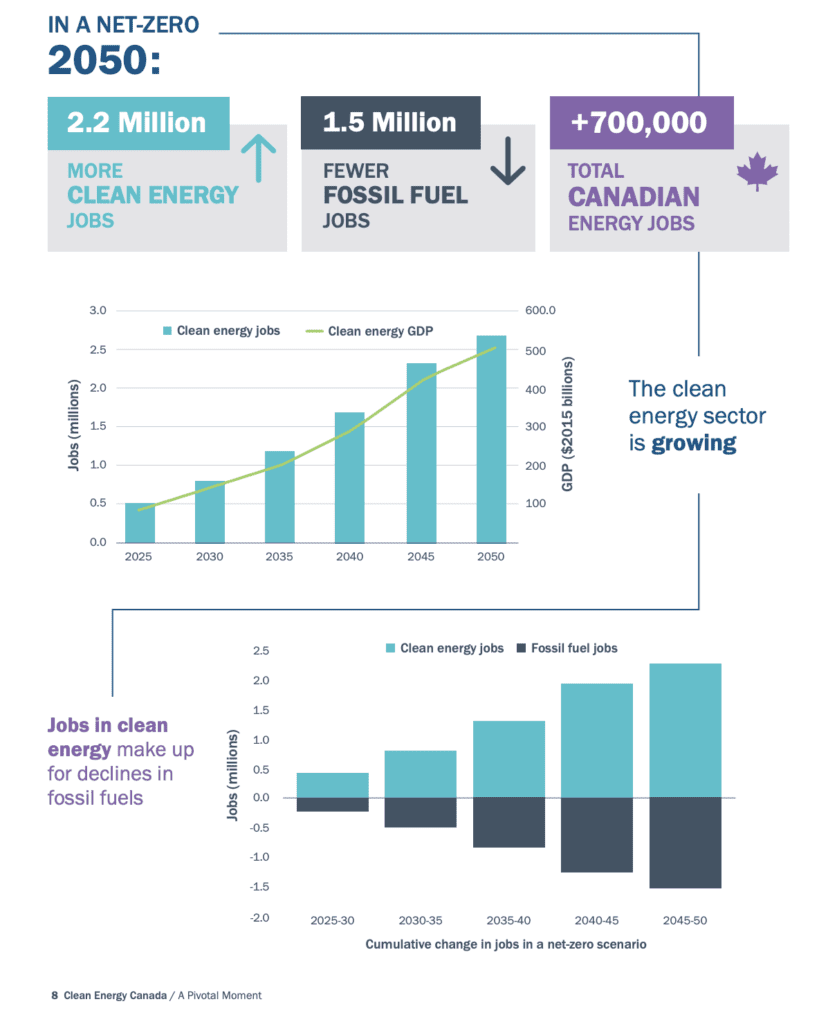Countries around the world are taking action to address climate change. This has significant implications for Canada, where a labour transition in the energy industry is on the horizon. Canada has taken small steps to prepare for this shift, but it is still missing robust legislation to give workers, communities and the general public confidence that no one will be left behind.
Canada’s job market of tomorrow will look quite different than it does today. A recent study from Clean Energy Canada predicts that as a result of the energy transition, jobs in the energy industry in Canada will decline by 93 per cent by 2050 but there will be 700 thousand more jobs in the entire energy industry than exist today!
The study found that as the world reaches net-zero emissions by 2050, the Canadian energy industry will see a decline of 1.5 million jobs due to a decrease in international demand for our oil and gas, which will be more than compensated by the creation of 2.2 million jobs in the clean energy industry.

The question is not whether Canada will have a transition, but whether the transition will be orderly and fair. This means ensuring that the new jobs are well-paid and located where workers and families want to be. It also requires ensuring that workers have the necessary skills for, and equitable access to, these new opportunities.
Canada’s current plans are promising, but insufficient
In 2019, the current federal government was elected on a promise of passing a Just Transition law that would prepare workers and communities for the transition. After four years of inaction on this topic, it released in late February 2023 its Sustainable Jobs Action Plan.
While the plan still needs to be translated into law to legally bind the government to its commitments, it represents a significant step forward in addressing the challenges of transitioning to a sustainable future. Among its positive steps, the plan includes commitments to:
- Prioritize social dialogue – the practice of regularly bringing affected parties to the table to meaningfully engage with them so that their input shapes the policy;
- Create a Sustainable Jobs Secretariat – a coordination hub for the government’s just transition strategy, which acts as a one-stop shop for workers and communities affected by the transition to get information and submit their input;
- Establish a Sustainable Jobs Partnership Council – an independent advisory body made up of affected parties and experts to guide the government’s strategy
These are all elements of successful and fair transitions in other countries.
Following the release of the action plan, the federal government tabled their 2023 budget, which was a mixed bag.
On one hand, it opened the door to important investments in clean electricity and manufacturing for the low-carbon economy but on the other, it failed to end subsidies to the oil and gas industry and continued to funnel public and private funds into false climate solutions like carbon capture and blue hydrogen..
The federal budget made an important stride towards a fair and orderly transition by attaching labour conditions to public funding for some clean technology projects. Companies who want to receive the full investment tax credit for their projects must hire apprentices and have unionized workers. This is important because as we transition to a sustainable economy, we want to create good green jobs, not jobs where workers have low wages and bad working conditions.
As the world moves towards a net zero future, demand for Canadian oil and gas will dwindle. Neither the Sustainable Jobs Action plan nor the 2023 Budget recognizes the need to plan for reduced fossil fuel production. This denial means we are wasting precious time to plan and put in place the support mechanisms for workers and communities who currently rely on the fossil fuel industry and other high-carbon industries, such as vehicle manufacturing and heavy industry.
Although steps have been made, Canada is still missing three big pieces to its sustainable jobs strategy
The Sustainable Jobs Act, expected in June 2023, is an opportunity for Canada to close the gaps in its current approach. To do so, the Act should include:
- The Sustainable Jobs strategy must be tied to real climate solutions, in sync with what Canada needs to do to actually reduce its emissions. This requires investing in renewables, clean transportation and energy-efficient solutions, while phasing out fossil fuels. This is important if we want to create jobs that are durable and contribute to a sustainable economy.
- Mechanisms for localized planning where all affected parties can participate, so every community, industry and Indigenous nation has a plan that speaks to its strengths and addresses its needs.
- Specific support programs for workers and communities that act as insurance policies during the transition period. For example, income and retraining support for workers pivoting jobs, early retirement options for those who want to, and funds for communities needing to diversify their local economy.
It’s important that each of these items is designed to advance greater equity than what is currently provided by our economic system. For example, local plans will need to be written in full partnership with affected parties, which includes Indigenous nations and groups historically excluded from the opportunities in the energy industry.
Support programs will need to be accessible to all, including the workers who aren’t currently fossil fuel workers but whose job depends on the industry. The rollout of climate solutions will also need to respect human rights, Indigenous rights and the principles of environmental justice.
Canada’s approach to a just transition has had some positive steps forward with the release of the Sustainable Jobs Action Plan and the 2023 budget, but it still falls short in several key areas. The upcoming Sustainable Jobs Act can not be a simple reiteration of existing commitments, it must fill the gaps in order to set Canada up for a fair and orderly transition to a sustainable future.








